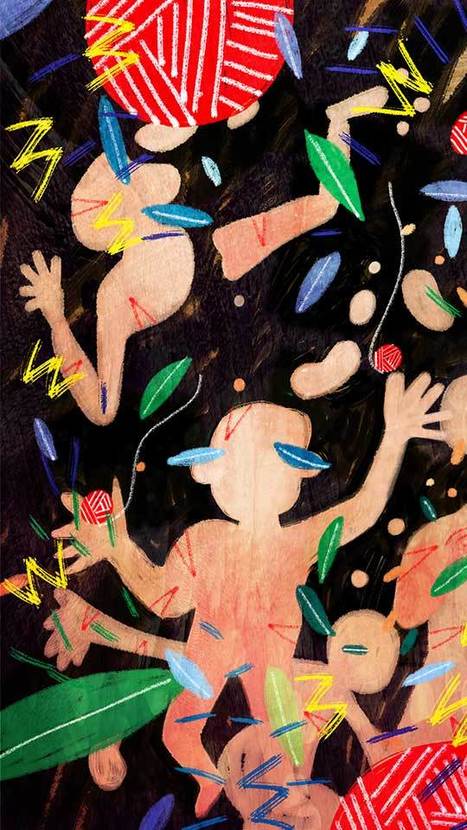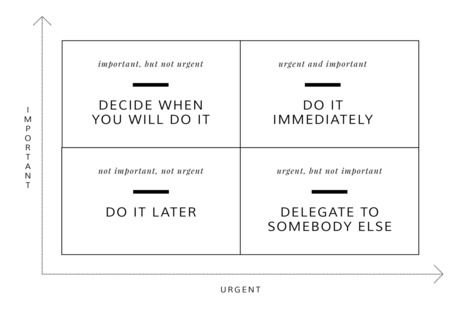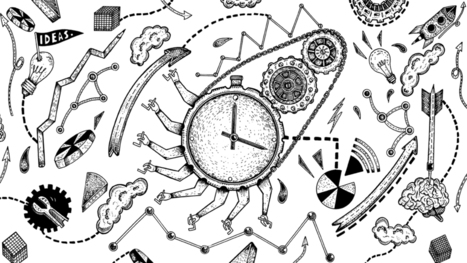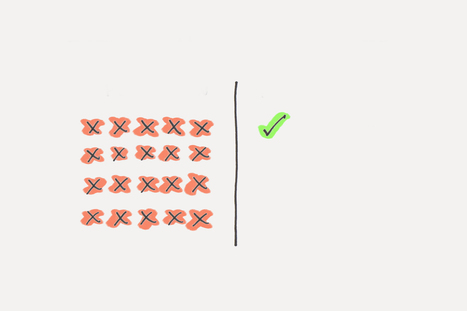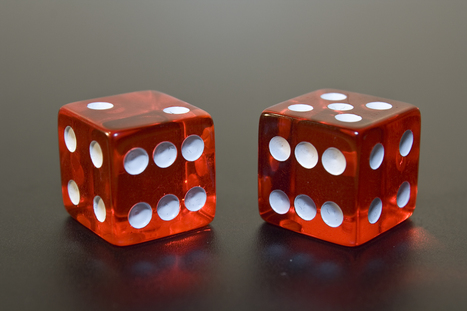 Your new post is loading...
 Your new post is loading...
Never before has it been so important for the C-suite to keep an eye on the macro and micro environment. Blink and you might have missed a seismic shift that could be cataclysmic. However, it’s not just the ability to maintain a forensic appreciation of the latest trends that are needed -- it’s the capability to adapt. But organizational change takes time -- particularly the decision making process behind the change. Therefore, a decision making framework through which all opportunities are assessed relative to the organization and external factors is probably the one essential business process in today’s fast-paced landscape.
Via David Hain
At the root of any good decision is categorizing what kind of decision needs to be made, by whom, and how quickly.
In this article, we share the results of new research quantifying the financial benefits of processes that “debias” strategic decisions. The size of this prize makes a strong case for practicing behavioral strategy—a style of strategic decision making that incorporates the lessons of psychology. It starts with the recognition that even if we try, like Baron Münchhausen, to escape the swamp of biases by pulling ourselves up by our own hair, we are unlikely to succeed. Instead, we need new norms for activities such as managing meetings (for more on running unbiased meetings, see “Taking the bias out of meetings”), gathering data, discussing analogies, and stimulating debate that together can diminish the impact of cognitive biases on critical decisions. To support those new norms, we also need a simple language for recognizing and discussing biases, one that is grounded in the reality of corporate life, as opposed to the sometimes-arcane language of academia. All this represents a significant commitment and, in some organizations, a profound cultural change.
Via David Hain
When faced with such decisions, we can examine one option at a time or review all our options together.
Via donhornsby
Want to know the secret to improving your decision making skills? It's easier than you think.
Via Daniel Watson
Intuition requires you to do the legwork. You can’t sit in an armchair and expect to be enlightened by some mystical wave of understanding.
Structure your organization’s work to encourage wise choices.
Making better decisions should be a high priority goal for every leader. Bad decisions are costly — in life and in business. Ask, What would Einstein do?
Via Dan Forbes
Have you ever lost out on an opportunity because you just couldn't make a decision in time? In business and in life, we're often required to think on our feet and make quick decisions.
Via The Learning Factor
There's a passage in Atul Gawande's Complications: A Surgeon's Notes on an Imperfect Science that captures three decades of research on human judgment. "The mind overestimates vivid dangers, falls into ruts, and manages multiples pieces of data poorly. It is swayed unduly by desire and emotion and even the time of day. It is affected by the order in which information is presented and how problems are framed." In this "news-feed" era, there's simply too much information. And as long as Google exists, it will be harder and harder to say "I don't know," even though the feel of not knowing--those vexing moments when we can't think of the answer--is the critical last step of problem-solving. Instead of pushing through a mental impasse, we pull out our phones and search for information, even though more information can often detract us from making an accurate judgment. It's a frustrating, self-perpetuating cycle.
Via The Learning Factor
The human brain is a marvelous tool. However, it was designed for a very different world than we currently live in. As a result, it retains many design flaws that do not serve us well, especially in today’s business world where new ways of thinking and ongoing innovation are essential for success. Perhaps the most damaging flaw is the brain’s tendency to think it’s right. In fact, it often insists it is right even in the face of contradictory evidence. So the next time you’re absolutely, positively sure you’re right, consider these 10 reasons not to trust your brain: 1. It jumps to conclusions.
The brain loves to solve problems. But as soon as a solution presents itself, the brain wants to accept it as the solution. Case closed – let’s move on to the next problem! No seeking alternative answers; no exploring possibilities. Not a good approach considering most business problems have more than one good solution and the act of exploring multiple right answers often opens doors to all sorts of success. 2. It sees what it wants to see.
The brain acts as a filter, constantly screening in and screening out information. Unfortunately, it tends to screen out information that contradicts our prevailing view of the world and let in that which supports it. Ever been jilted by a romantic partner and wondered why you were the last to know? Ever been sure you had the right data and looked at the information again to find you were way off? The signs were usually there all along. Your brain just didn’t want to see them. 3. It distorts incoming information.
The brain also twists and distorts incoming information so that it aligns with our attitudes, beliefs, and assumptions. If you don’t believe this, try watching Fox News or MSNBC. They make a living out of taking the same information and twisting it to suit their own agendas. Our brains do the same thing; they just don’t get to do it on national TV most days. 4. It ignores the obvious (and then tries to justify it).
We know that drunk driving is dangerous, and texting behind the wheel is even worse. Yet we do them anyway. Why? Because our brain tells us we won’t get caught. Or, it assures us we won’t get in an accident. Or, we really are that important that we have to respond immediately and ignore the safety of ourselves and others. After all, it always happens to someone else, right? 5. It’s not designed for multitasking.
In today’s time-deprived, hyper-paced world, our brain wants to convince us of the virtues of multitasking. Yet, research shows again and again that multitasking increases stress, inhibits creativity, and makes us less efficient. Pause and think about that the next time you try to do five things at once! 6. It constantly makes stuff up.
In the absence of information, we make stuff up. We do it all the time, and then we believe it to be true! Our brain won’t live with a void so it fills in the blanks. Most of what we make up is negative, and usually worse than the truth. Just listen to your internal dialog the next time the boss calls you into her office and you don’t know what for. 7. It seeks to avoid threats rather than pursue opportunities.
Coming up with new ideas and new ways of doing things requires going out on a limb. However, in most cases the brain will choose avoidance of pain over the pleasure of some future reward. Not a good way to support innovation, which includes a certain amount of pain (failure) in order to succeed. 8. It wants to stick with the known.
When stressed, the brain seeks comfort in what it is familiar with – even when it becomes obvious that the old way is no longer working. That’s why people stay in bad jobs or bad relationships. That’s why leaders hang on to projects that are clearly losing money and sucking up resources that could be better applied elsewhere. Our brains like what is familiar, not necessarily what is the best for us. 9. It thinks everyone else sees the world the same way.
Logically, we know this isn’t true. But when presenting a new idea or a solution to a problem, how often do we unconsciously assume that everyone in the room sees it the same way? Then we wonder why people look at us like we’re from another planet. 10. It has too much confidence in its own abilities.
Research shows that experts are only slightly more accurate than non-experts when making predictions in their fields. Moreover, when confronted with their errors, the experts almost never blamed their thinking or changed their beliefs. Instead, most attributed their mistakes to outside factors beyond their control. The next time your brain insists you’re right because you’re an expert in your field or “we’ve always done it that way,” you might want to step back and look at the situation from a different perspective. Getting the best of your brain What can you do to counteract these brain design flaws? Constantly challenge your ideas, attitudes, and assumptions about your business and your customers.Scan the horizon for emerging threats, especially those beyond your industry. Actively seek out data that disagrees with your current point of view.Make your thinking process visible to others by stating your assumptions and describing the data that led to them. Publicly test your conclusions by encouraging people to give feedback.When problem solving, don’t just accept the first good solution that comes along. Instead, pause to ask, “Does anyone else see it differently? What if there’s a better way?”Don’t make decisions without hard data. Establish processes for verifying and validating your data. An ounce of accurate information outweighs a ton of assumptions that may or may not be true.Ask “What if… ?” questions. “What if our ‘right’ answer is wrong? What if there is another way to look at this problem? What if we looked at it from the customer’s perspective; how would they solve this problem?”Develop more focus. Talk about winning relentlessly. Use visuals to keep yourself and others focused on the goal. Each morning ask, “Will what I do today make a difference a year from now?” Finally, never take your success for granted. Just because something worked for you in the past does not guarantee that it will continue to work in the future. Albert Einstein once said, “Two things are infinite, the universe and human stupidity, and I’m not sure about the universe.” I don’t think we’re stupid. But I do believe we get hoodwinked by our own brains because we don’t check in with them to see what’s really going on.
Via Daniel Watson
|
To make a good decision, you need to have a sense of two things: how different choices change the likelihood of different outcomes and how desirable each of those outcomes is. In other words, as Ajay Agrawal, Joshua Gans, and Avi Goldfarb have written, decision making requires both prediction and judgment. But how do you get better at either? We’ve published volumes on this subject —here are a few of my favorites — but there are three rules that stand out. Following them will improve your ability to predict the effects of your choices and assess their desirability. Rule #1: Be less certain. Nobel-prize-winning psychologist Daniel Kahneman has said that overconfidence is the bias he’d eliminate first if he had a magic wand. It’s ubiquitous, particularly among men, the wealthy, and even experts. Overconfidence is not a universal phenomenon — it depends on factors including culture and personality — but the chances are good that you’re more confident about each step of the decision-making process than you ought to be. So, the first rule of decision making is to just be less certain — about everything. Think choice A will lead to outcome B? It’s probably a bit less likely than you believe. Think outcome B is preferable to outcome C? You’re probably too confident about that as well. Once you accept that you’re overconfident, you can revisit the logic of your decision. What else would you think about if you were less sure that A would cause B, or that B is preferable to C? Have you prepared for a dramatically different outcome than your expected one? You can also practice aligning your level of your confidence to the chance that you’re correct. Try out quizzes like this one or this one. You’ll realize that while it’s not possible to always be right, it’s totally possible to become less overconfident.
Via The Learning Factor
For a long time, researchers and economists believed that humans made logical, well-considered decisions. In recent decades, however, researchers have uncovered a wide range of mental errors that derail our thinking. Sometimes we make logical decisions, but there are many times when we make emotional, irrational, and confusing choices.
Psychologists and behavioral researchers love to geek out about these different mental mistakes. There are dozens of them and they all have fancy names like “mere exposure effect” or “narrative fallacy.” But I don’t want to get bogged down in the scientific jargon today. Instead, let’s talk about the mental errors that show up most frequently in our lives and break them down in easy-to-understand language.
Here are five common mental errors that sway you from making good decisions.
Via David Hain
To lead a good life, we need to make good decisions: manage our health and financial affairs, invest in appropriate relationships, and avoid serious lapses like falling for online scams. What equips us to do this? One candidate is IQ: after all, people who score higher on intelligence tests tend to go on to do better academically and in their careers. But many of us know intellectual titans who still make grave errors of judgment in their lives. Book-smart doesn’t necessarily make you life-smart, and a new article in the journal Thinking Skills and Creativity examines the utility of IQ in navigating existence, and how another mental ability may put it in the shade.
Whereas IQ is – crudely speaking – a measure of the mental horsepower we have for handling abstract content, some researchers say that “critical thinking” – the ability to make judgments dispassionately without jumping to false conclusions – is a separate ability. To find out if critical thinking ability might be important for real-life outcomes, perhaps even more than IQ, Heather Butler of California State University and her colleagues asked 244 participants – a mix of students and adults recruited online – to complete tests, of their IQ and critical thinking skills.
Via David Hain
The ultimate solution for many organizations looking to untangle their decision making is to become flatter and more agile, with decision authority and accountability going hand in hand. High-flying technology companies such as Google and Spotify are frequently the poster children for this approach, but it has also been adapted by more traditional ones such as ING (for more, see our recent McKinsey Quarterly interview “ING’s agile transformation”). As we’ve described elsewhere, agile organization models get decision making into the right hands, are faster in reacting to (or anticipating) shifts in the business environment, and often become magnets for top talent, who prefer working at companies with fewer layers of management and greater empowerment.
As we’ve worked with organizations seeking to become more agile, we’ve found that it’s possible to accelerate the improvement of decision making through the simple steps of categorizing the type of decision that’s being made and tailoring your approach accordingly. In our work, we’ve observed four types of decisions
Via David Hain
Putting people at the core is the key to major improvements in financial, performance, regulatory, and quality indicators.
What makes big decisions so hard? As a decision coach, I see many people struggle with tough choices, because they really, really want to have no regrets. While I’ve never met anyone who felt they got it right 100% of the time, going back to the basics can help you get clear on what you want and feel better about moving forward. Here are five simple strategies I’ve learned for lessening the odds that you’ll look back and wish you did it differently.
Via The Learning Factor
And how mindfulness training can help
I always ask aspiring business people: How do you beat Bobby Fischer, the renowned chess champion of the 1970’s? The Answer: Play him at anything but chess. This excerpt is from the second chapter of Seymour Schulich’s book, Get Smarter: Life and Business Lessons. Schulich is a self-made billionaire.
Via The Learning Factor
How do people process different inputs and make complicated decisions? Variations on this question have engaged researchers for many years, with broad implications for a variety of individuals. But the topic is of particular interest to business executives, who must frequently make decisions.
Researchers have long sought to shed light on the inner workings of the human brain and the way people make decisions. In recent years, curiosity about the decision-making process has heated up, attracting academics from fields as diverse as neuroscience, management, behavioral economics and psychology. Here are highlights of a handful of recent scholarly articles that offer intriguing insights into decision making from several disciplines.
Via The Learning Factor
“We get stuck between two choices when we have a desire to do something, but the fears – fear of the unknown, risk, failure, success – keep us stuck and unable to move forward,” says Larina Kase, a cognitive-behavioural psychologist and author of The Confident Leader (McGraw-Hill, 2008) “The heart and the head are in conflict.” Most of us revert to listing pros and cons, but the exercise rarely helps. “We continue to be stuck because the pros and cons for each choice are roughly equal or because there are too many variables,” Kase says. “There are so many considerations on both sides that it can become paralysing.” To get unstuck and finally make a firm decision, consider these five steps: 1. Uncover your hidden fears.
To move forward, you must first understand what exactly you fear. “It is unique to everyone,” Kase says. “It often requires digging below the initial fear, which is typically something like, ‘What if I’m not successful?’” To dig deeper, ask yourself, what would happen if that fear came true? What would you lose or jeopardise? Your answers will help make the fear more specific to you. “Be on the lookout for a mood shift,” says Kase, noting that emotional cues can serve as a guide. “As soon as you notice yourself feeling uneasy, unsettled, or uncomfortable, ask yourself, ‘What thought just went through my mind?’” That thought is triggering anxiety, so it’s likely rooted in fear. 2. Keep anxiety in perspective.
Often, we imagine the consequences of our fears will be extreme. We think, ‘I will never be a good leader if I’m terrified of public speaking,’ or, ‘I will lose all respect from my peers if my business fails.’ The reality is never so black and white. “We reduce anxiety by challenging negative thoughts,” Kase says. When you notice a fearful thought, think of a time when the opposite was true, or ask yourself if there is any reason to doubt that assertion. The goal is to see that your negative belief about what will happen is not absolutely certain, or even likely – even if it feels that way right now. 3. Do what you fear in small doses.
Testing your fears is the most powerful way to overcome them. Start by trying activities that give you some anxiety but not too much. For example, people who worry that others will judge their failures might take a dance class, if they have two left feet. “Gradual exposure builds confidence and shows us that the feared consequence is unlikely to come true,” Kase says. 4. Commit for one hour.
Another way to get closer to a decision is to imagine you’ve already made one. Spend one hour pretending as though you’ve committed to one option. Do a minor task toward your goal and notice thoughts or feelings that come up as you play the role. “Remember that most people are happiest with choices where they went with their gut rather than when they talk themselves into something that looks good on paper but doesn’t resonate on a deeper level,” Kase says. If your gut tells you to do it, that’s a sign. 5. Trust that you know what to do.
If you’re doing endless research to find the “right” choice, give it a rest. “Paradoxically, when making more complex choices, we do better when we go with our gut instincts, rather than weighing all the variables,” Kase says. Your intuition unconsciously takes into account all the information available to you, including your values and goals, and is likely to guide you to the best choice. If you’ve lost touch with your instincts, give yourself space to find them. Take a walk, get a spa treatment, or play basketball with your friends – whatever you find relaxing and enjoyable. “You may find that rather than trying to chase down the decision, it comes to you,” Kase says. If you listen to your gut, you will make a much better choice.
Via Daniel Watson
|



 Your new post is loading...
Your new post is loading...





